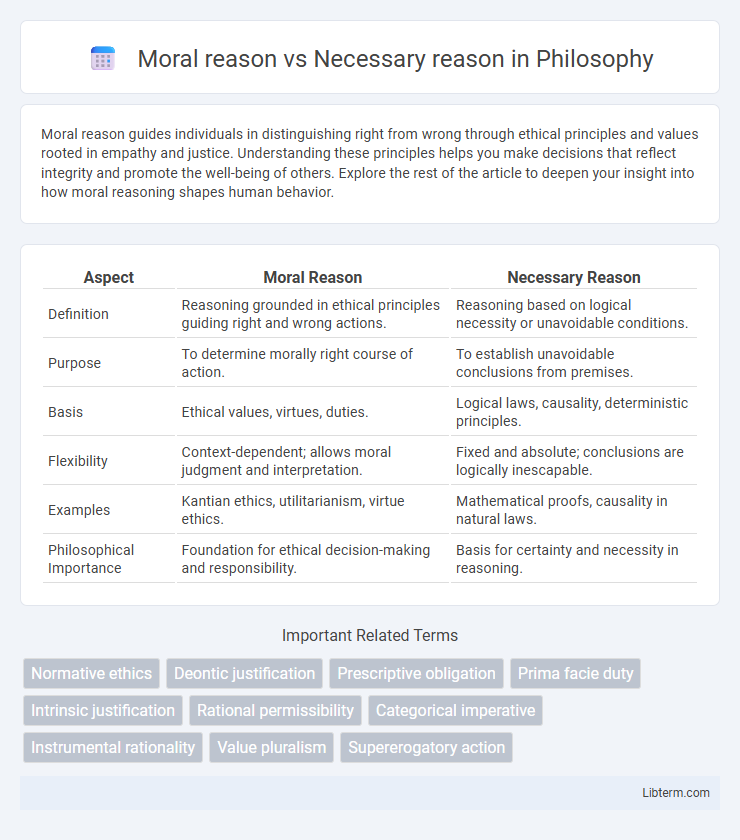Moral reason guides individuals in distinguishing right from wrong through ethical principles and values rooted in empathy and justice. Understanding these principles helps you make decisions that reflect integrity and promote the well-being of others. Explore the rest of the article to deepen your insight into how moral reasoning shapes human behavior.
Table of Comparison
| Aspect | Moral Reason | Necessary Reason |
|---|---|---|
| Definition | Reasoning grounded in ethical principles guiding right and wrong actions. | Reasoning based on logical necessity or unavoidable conditions. |
| Purpose | To determine morally right course of action. | To establish unavoidable conclusions from premises. |
| Basis | Ethical values, virtues, duties. | Logical laws, causality, deterministic principles. |
| Flexibility | Context-dependent; allows moral judgment and interpretation. | Fixed and absolute; conclusions are logically inescapable. |
| Examples | Kantian ethics, utilitarianism, virtue ethics. | Mathematical proofs, causality in natural laws. |
| Philosophical Importance | Foundation for ethical decision-making and responsibility. | Basis for certainty and necessity in reasoning. |
Introduction to Moral and Necessary Reasons
Moral reasons are considerations that justify actions based on ethical principles, reflecting what one ought to do to promote good or prevent harm. Necessary reasons refer to factors that compel action due to logical, causal, or pragmatic constraints, often seen in situations demanding unavoidable responses. Understanding the distinction clarifies how motivations arise from values versus objective necessities in decision-making processes.
Defining Moral Reason: Meaning and Scope
Moral reason refers to the rationale grounded in ethical principles and values that guide human behavior toward what is considered right or just. It encompasses obligations, duties, and virtues that extend beyond mere compliance with laws or practical necessities. The scope of moral reason involves evaluating actions based on fairness, harm, and respect for others, influencing decisions that prioritize collective well-being and moral integrity.
Understanding Necessary Reason: A Philosophical Overview
Necessary reason refers to the logical basis or fundamental causes that make an event or action inevitable within a given set of conditions, often examined through causal necessity and deterministic frameworks in philosophy. Unlike moral reason, which is grounded in ethical principles and values, necessary reason emphasizes objective explanations rooted in metaphysical or epistemological grounds. Philosophers investigate necessary reason to uncover the essential truths and conditions that govern existence and rational decision-making beyond subjective moral considerations.
Distinctions Between Moral and Necessary Reasons
Moral reasons are grounded in ethical principles and obligations that guide behavior toward what is right or just, while necessary reasons are based on practical needs or conditions required to achieve a specific outcome. Moral reasons appeal to values such as fairness, duty, or rights, whereas necessary reasons depend on facts, circumstances, or instrumental goals critical for success or survival. The distinction lies in how moral reasons prioritize normative considerations, while necessary reasons emphasize causal or functional necessities.
The Role of Ethics in Shaping Moral Reason
Ethics provides the foundational principles that guide moral reason by establishing standards for evaluating right and wrong beyond mere necessity. Moral reason involves deliberation grounded in values such as justice, fairness, and human dignity, which transcend practical or necessary reason focused on outcomes or survival. The role of ethics in shaping moral reason ensures decisions respect intrinsic human rights instead of solely addressing instrumental or expedient considerations.
Logical Foundations of Necessary Reason
Necessary reason rests on logical foundations derived from strict principles of validity and necessity, ensuring that conclusions follow inevitably from premises. This form of reasoning operates within formal logic systems, emphasizing determinacy and the absence of exceptions. Moral reason, by contrast, engages with normative principles and subjective values, often allowing for context-dependent interpretations rather than universally necessary outcomes.
Case Studies: When Moral and Necessary Reasons Collide
Case studies reveal that moral reasons, based on ethical principles and values, often conflict with necessary reasons driven by practicality or survival. In medical triage, healthcare providers face moral dilemmas when necessary decisions prioritize resources, potentially compromising individual patient care. These scenarios underscore the tension between adhering to moral obligations and responding to urgent, pragmatic needs in decision-making processes.
Implications in Law and Society
Moral reasons involve principles of right and wrong that guide individual behavior, while necessary reasons are based on logical or practical requirements essential for a particular outcome. In law and society, moral reasons influence the development of ethical norms and human rights frameworks, shaping legislation that promotes justice and fairness. Necessary reasons underpin legal reasoning and procedural rules, ensuring consistent application of laws and maintaining social order through enforceable standards.
Debates and Critiques: Philosophers on Moral vs Necessary Reason
Philosophers critically debate moral reason as grounded in ethical principles guiding right action, contrasting it with necessary reason, which emphasizes logical or practical necessity for decision-making. Critics argue moral reason prioritizes values and duties possibly independent of empirical facts, while necessary reason demands consistency and unavoidable conclusions derived from rational premises. Key discussions focus on whether moral reasoning can be universally necessary or context-dependent, with figures like Kant advocating moral reason's categorical imperative and Hume challenging its objectivity.
Conclusion: Synthesizing Moral and Necessary Reason
Synthesizing moral and necessary reason requires balancing ethical principles with practical considerations to achieve outcomes that are both just and feasible. Moral reason grounds decisions in values, rights, and duties, while necessary reason emphasizes efficiency, constraints, and consequences. Effective decision-making integrates these dimensions, ensuring actions are ethically sound and pragmatically viable.
Moral reason Infographic

 libterm.com
libterm.com